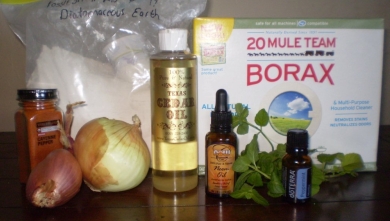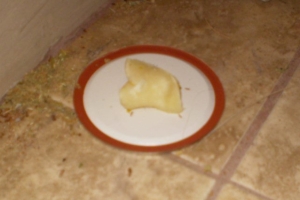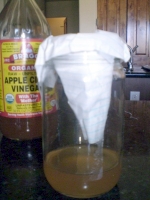Whether invading your kitchen, attacking your garden, or infesting your pets, insects and other uninvited pests are a time-consuming nuisance and may even present a risk to your health. The strong chemicals found in most commercial bug-killers and repellents may further compromise the safety of your environment. So how can you win the war against pests and still keep your family safe? Consider our four R's of natural pest control: Remedies, Recipes, References, and Resources.
Remedies
There are a myriad of natural pest-control options. It's often a trial-and-error process to find the right blend or product for your situation. Listed below are some potential pest remedies.
- Garlic and/or onion and/or cayenne. Liquid sprays can be made with any or all of these to help deter/kill pests inside and outside.
- Cedar is often used as a moth repellent, but is also effective against other pests.
- Diatomaceous earth (DE) consists of fossilized remains of diatoms, a type of hard-shelled algae. DE is effective against insects with an exoskeleton. Be sure to choose food grade.
- Pyrethrum. Pyrethrum powder comes from ground chrysanthemum flowers and contains pyrethrin, a natural pesticide. This is not the same as pyrethroid, which is a synthetic pesticide. (Cats are sensitive to low doses and some may be allergic to pyrethrum.)
- Borax and all derivatives. Borax is a natural compound with powerful dehydrating affects and a wide range of applications as a pesticide. Borax is a toxin and must be used cautiously when children and pets are nearby. (See our Borax: Friend or Foe? article for relevant safety information.)
- Neem oil. The key insecticidal ingredient found in the neem tree is azadirachtin, a naturally occurring substance that disturbs or inhibits the development of insect eggs, larvae, or pupae. Diluted neem oil sprayed on plants can control aphids, moth larvae, spider mites, whiteflies, and Japanese beetles. It will not harm insects that do not chew the leaves, like butterflies, ladybugs, and bees.
- Essential oils. Peppermint, lavender, lemongrass, eucalyptus, basil, and clove are just a few of the effective oils.
Recipes
- All-Purpose Pesticide Powder
- 1/2 c. bay leaves
- 1/2 c. peppermint leaves
- 1 1/2 tsp. each citrus peel, garlic powder, diatomaceous earth, cayenne pepper, pyrethrum, salt
Grind the ingredients into a powder using a blender or mortar and pestle. Dust along affected areas.
- Homemade Ant Trap

- 1 tbsp. hot water
- 1 tbsp. honey or sugar
- 1/2 tsp. borax
Place the ingredients in a small glass jar and shake to mix. Soak a cotton ball in the mixture, slightly squeeze out the excess liquid, and put the cotton ball on a small lid. Place the ant trap where you see the most ants. After the ants have disappeared, discard the cotton ball and keep the lid for reuse.
- Neem Oil Insectide
- 1 qt. warm water
- 2 tsp. dishwashing liquid
- 5 tsp. neem oil
Mix water and dishwashing liquid. Slowly add the neem oil while stirring the mixture vigorously. Don't prepare more of the neem oil insecticide than you'll need, as it will lose its potency if stored. (1 oz. neem oil mixed with 10 oz. coconut oil makes an excellent mosquito repellent!)
- All-Purpose Onion/Garlic/Cayenne Spray
- 1 garlic bulb, chopped or ground
- 1 small onion, chopped or ground
- 1 tbsp. cayenne pepper
- 1 qt. boiling water
- 1 tbsp. liquid castile soap
Mix garlic, onion, cayenne pepper and water; add liquid soap. Shake and pour into spray bottle. Freeze for long-term storage.
- Apple Cider Vinegar Jar

Pour an inch or so of apple cider vinegar into the bottom of a wide-mouth jar. Make a funnel with a sheet of white paper with a 3/4-inch hole on the bottom. The bottom should not touch the vinegar. Place the funnel into the jar and tape edges to secure the funnel to the jar. Effective against fruit flies and gnats.
References
Here are a few natural solutions recommended for specific pests.
- Ants: Peppermint, soapy water, cucumber peels, mint tea bags, dry mint leaves, cayenne pepper, borax and sugar (see ant trap recipe above), diatomaceous earth (DE).
- Aphids: Spray streams of water onto plants to dislodge heavy concentrations of aphids. Use a mixture of castile soap and water to spray on smaller concentrations; the soap will dry out their exoskeleton and dehydrate them. Add peppermint essential oil for added potency. Garlic spray can also be effective.
- Beetles: Pyrethrin, neem oil, peppermint, thyme.
- Box Elder Bugs: Plant-based essential oils such as lavender, eucalyptus, cinnamon, citrus, and tea tree oil are effective natural repellents. Citrus oil is caustic to the exoskeleton and can also work as a pesticide.
- Fleas: Borax, DE, lavender, lemongrass, peppermint , citrus peel extract. See the Resources section below for a natural flea-control company.
- Flies: Basil, clove, eucalyptus, lavender, peppermint.
- Four-legged garden pests: For squirrels, chipmunks, deer, etc., onion/garlic/cayenne spray can be an effective deterrent (see recipe #4 above). For more suggestions, see this article.
- Gnats/Fruit Flies: Apple cider vinegar jar (see recipe #5 above).
- Mice: Mice tend to avoid mint. Place fresh mint boughs where mice are present, or spray diluted mint oil. For bait, crush a vitamin D pill and blend with cheese.
- Mosquitoes: Herbs that repel mosquitoes include cedarwood, lemongrass, peppermint, and garlic. The organization Beyond Pesticides offers this helpful article titled Backyard Mosquito Management.
- Spiders: Spiders help keep the pest population at bay, but too many spiders can be unnerving—to say nothing of the poisonous ones. Diatomaceous earth is effective because as spiders walk across it, the razor-sharp microscopic fossils penetrate the exoskeleton, causing the spider to dehydrate and die. Suggested spider repellents include essential oils such as tea tree, eucalyptus, citronella, and peppermint.
- Termites: Cedar oil, nematodes.
- Ticks: Cedar oil, DE, rose geranium oil, lavender, lemongrass, citronella.
Resources
- More do-it-yourself pest-control ideas can be found at the Beyond Pesticides website.
- See this state-by-state listing to find a pest-control operator in your area who uses less toxic products.
- All-natural cedar pest-control products are available at The Cedarcide Store and Southwestern Cedar Oil.
- ARBICO Organics offers several natural pest-control solutions.
- See the Fleabusters website for a company offering natural flea-control products and services.